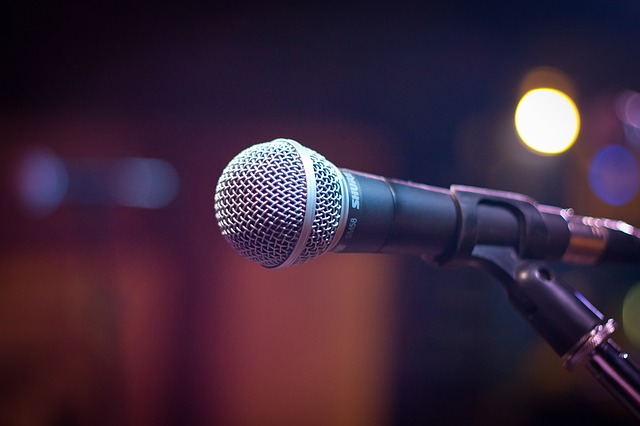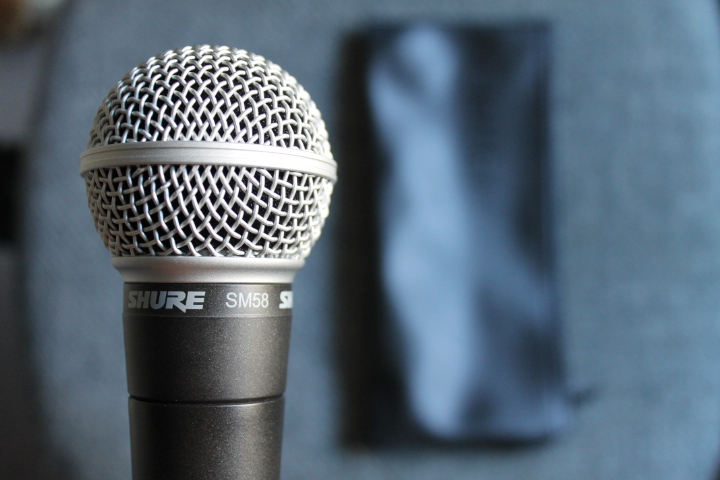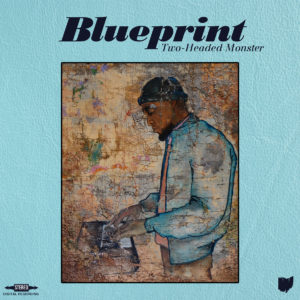
Tools of the Trade: Shure SM58 Microphone

One of the most frequent questions I get when I meet other artists is about the gear I use to make music with. It might even be the most frequent question I ask other artists as well. I think the reason we are fascinated with this is because it gives us an inside look into another person’s process. It also allows us to learn about new gear without using or purchasing it.
By no means do I consider myself an expert on gear, but I would like to start blogging more about specific gear I use frequently. I will call this series of short blogs Tools of the Trade.
The first piece of gear I would like to review is the Shure SM58 dynamic microphone.
If you were to go to pretty much any music venue in the United States that’s worth anything, you will find one microphone in almost all of them–the Shure SM58. One reason this microphone is in 99% of the music venues in this country is because it is the most solid microphone ever created at it’s price range. Personally, I’ve used it on every album I’ve ever made and recommend it to anybody starting a home studio.
I would like to break down my evaluation of this microphone into four main areas:
PRICE
At just $99, you can’t find a better professional mic in it’s price range. Even decades after it’s release, there isn’t really anything close. And for people who are starting a home studio that don’t have much of a budget, $99 is a great entry price.
The price has made it to where I don’t have to worry replacing this mic. In fact, they’re so affordable that I usually replace mine every four to five years.
DESIGN
The look is simple and rugged. It’s made of metal from top to bottom. No plastic anywhere. It feels heavy in your hand like all classic gear feels. You know it’s solid as soon as you pick it up. It’s all one color and doesn’t even have an power switch on it. There’s nothing aesthetic about it that jumps out.
I currently own other mics that look nicer and are more expensive than the SM58. However, I probably wouldn’t feel comfortable traveling with any of those mics because I would be too worried about them getting beat up. On the other hand, I almost always travel with the SM58. In fact, for the last few years, I’ve kept a SM58 in my gear bag when I’m on tour.
There are many venues that typically hosted DJs, not vocalists. In these places, they may have great sound systems, but cheap mics since they rarely book vocalists. On those nights, I bust out the SM58 and I’m good to go. Once we’re done playing, I throw it back in my bag, and I never have to worry about it being damaged. Thankfully, I’ve only had to do this six or seven times on tour, but it was definitely a show-saver.

VERSATILITY
From room mics, to stage mics, to studio mics, to drum mics, to vocal mics–different mics have different specialities. But when it comes to the two areas that I focus on the most–studio and live performances–the SM58 is the perfect balance. There are nicer studio mics and there are nicer stage mics, but I’m not sure if there is a better microphone that combines those two dynamics in the same price range as the SM58. And, as I mentioned above, this allows me to travel with the same mic I use in the studio without being set back financially if it’s ever lost, damaged, or stolen.
SOUND
One of the problems I’ve noticed with other mics in the SM58’s price range is that they all tend to have too much high end and sound thin. This seems to be the case for many low end dynamic mics as well as most of the USB microphones that I’ve used. Inexperienced people may not notice this at first (thinking the extra high end is clarity), but will often find themselves adding a ton of EQ and effects to their vocals in order to offset the excessive high end. Ideally, the vocals should sound thick and full with only compression and without any significant EQ. The SM58 has a great balance of highs, mids, and lows that make it suitable for almost any vocalist. I’ve got somewhat of a high voice and it makes my vocals sound warm and thick. For a vocalist with a voice as weird and dynamic as mine, it’s a must that I use a mic that captures the full dynamic range of my voice accurately in my recorded music.
The same rules apply in live music. Thankfully, the majority of soundmen were trained on and have extensive experience mixing on the SM58. This allows them to dial in your sound quickly and accurately. Even when music venues upgrade to nicer microphones, best believe they still keep the SM58’s around because of it’s sound and reliability.
CONCLUSION
While I have recently started using the Shure SM7B microphone, I used the Shure SM58 on every album that I have recorded and released from 1999 up until now. There’s a reason this mic has the reputation and longevity among those in music venues and the recording industry and I can’t recommend it highly enough for a mic in it’s price range.
Word is Blog
p.s. please understand that this blog is not meant to be a technical review of the microphone, which is why it is deliberately written at a high level. This is for the average artist who may be considering building a home studio or one who may be considering a second mic–not a professional engineer.
BLUEPRINTMy latest album Two-Headed Monster is out now. Order/Listen here HERE


